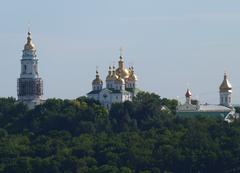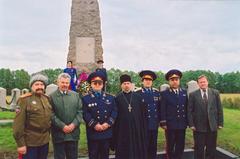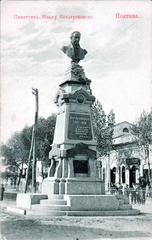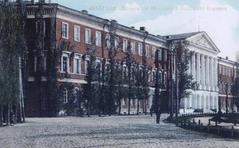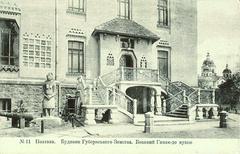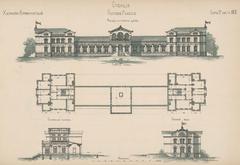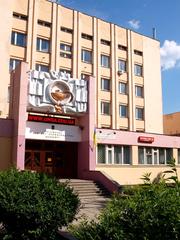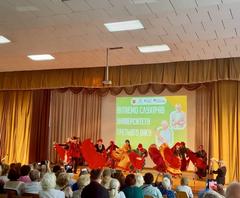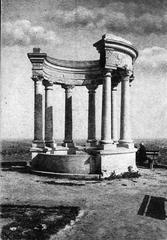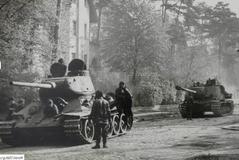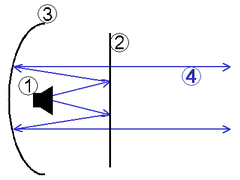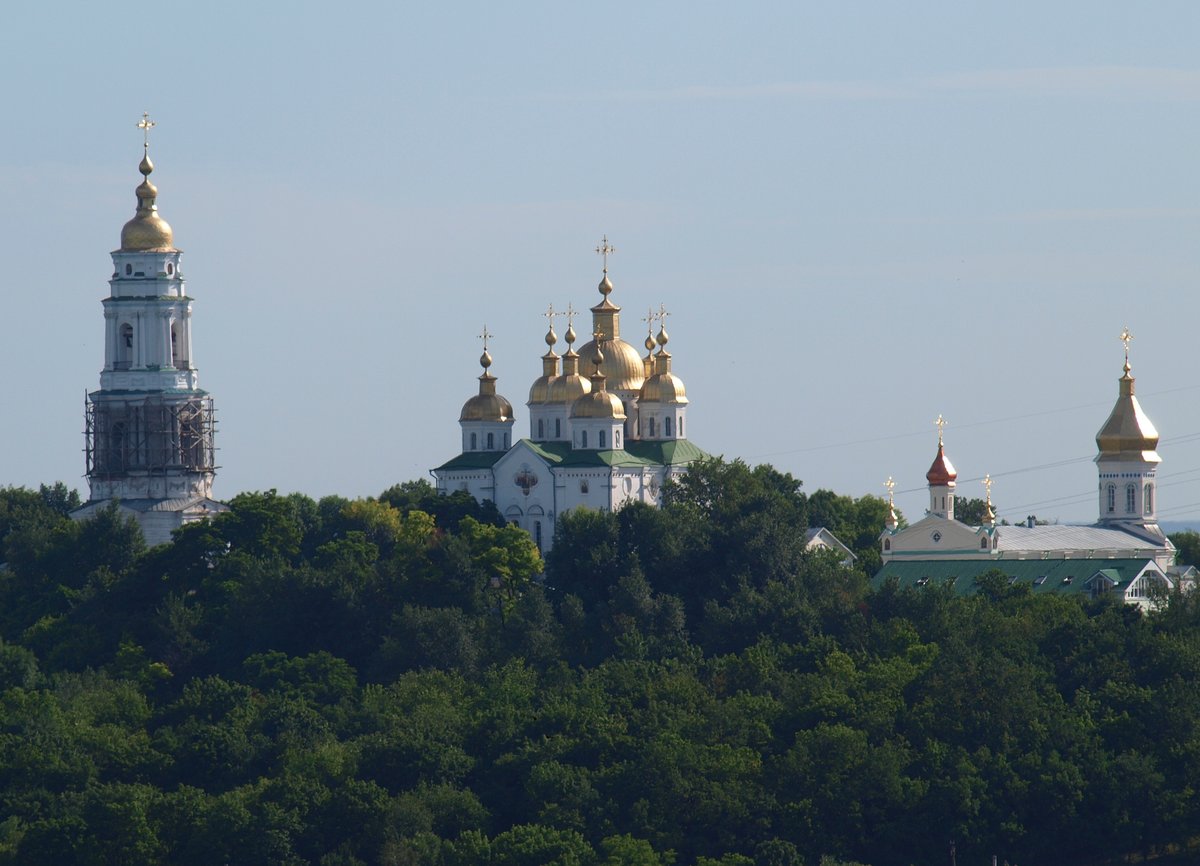
Monastery of the Holy Cross Poltava: Visiting Hours, Tickets, and Historical Significance
Date: 15/06/2025
Introduction
Perched atop a picturesque hill overlooking the Vorskla River, the Monastery of the Holy Cross in Poltava, Ukraine, stands as a beacon of the nation’s cultural, architectural, and spiritual heritage. Established in 1650 by Metropolitan Sylvester Kossov in honor of a pivotal Cossack victory, the monastery has witnessed centuries of transformation, from the Khmelnytsky Uprising to the Battle of Poltava. Today, it is celebrated not only for its historical depth but also for its stunning Ukrainian Baroque architecture and vibrant religious life.
This guide provides everything you need to plan a meaningful visit: historical context, architectural highlights, visitor information, accessibility tips, and details on nearby attractions. Whether you are a history enthusiast, architecture lover, pilgrim, or traveler, this resource will help you experience the best of the Monastery of the Holy Cross.
For up-to-date details on visiting, consult the official monastery website and Poltava tourism portals. (Monastery of the Holy Cross Visitor’s Guide) (Poltava Tourism Board) (Battle of Poltava Historical Context)
Table of Contents
- Introduction and Historical Overview
- Architectural Highlights
- Visiting Hours and Ticket Information
- Guided Tours and Events
- Accessibility and Visitor Tips
- Nearby Attractions
- Facilities and Amenities
- Frequently Asked Questions (FAQ)
- Visuals and Media
- Summary and Planning Resources
Historical Significance
Founded in 1650, the Monastery of the Holy Cross holds a central place in both local and national history. Its establishment commemorated a key Cossack victory, and over centuries it became a spiritual stronghold in Poltava. The monastery played a crucial role during the Khmelnytsky Uprising, the Great Northern War, and notably the 1709 Battle of Poltava—serving as headquarters to Swedish King Charles XII and later being visited by Peter the Great (battle.poltava.ua). By 1775, it was also an important ecclesiastical center as the seat of the bishops of the Eparchy of Slaviansk and Kherson.
Architectural Highlights
The monastery complex is a masterful example of Cossack Baroque, with later Neoclassical elements. Its centerpiece, the five-domed Exaltation of the Holy Cross Cathedral (completed in 1709), is renowned for ornate stucco work, original 18th-century majolica tiles, and a richly decorated iconostasis (visitukraine.today). The 47-meter bell tower, constructed in 1786, offers panoramic views of Poltava and the Vorskla River valley (codelt.nl). The monastic complex also includes the Trinity Church, refectory, monastic cells, and a cemetery with memorials to historical figures.
Notably, the monastery has inspired artists like Taras Shevchenko, whose 1845 painting immortalized its serene setting (artchive.com).
Visiting Hours and Ticket Information
- Hours: Open daily, typically from 7:00 AM to 7:00 PM. During major Orthodox holidays, hours may be extended.
- Admission: Entrance to the grounds is free. Donations are appreciated, especially for supporting restoration and guided tours. Special events or guided tours may require a small fee.
- Guided Tours: Available in Ukrainian and Russian, with English tours upon request. Advance booking is recommended during peak times (visitpoltava.com).
Guided Tours and Events
Guided tours provide insights into the monastery’s history, architecture, and religious life. Tours last 45–60 minutes and highlight the cathedral, bell tower, refectory museum, and cemetery. Audio guides and printed brochures are available at the kiosk. The monastery hosts Orthodox feasts (notably the Feast of the Exaltation in September), sacred music concerts, and the annual “Poltava Baroque Days” featuring choral and craft events (poltava.travel).
Accessibility and Visitor Tips
- Getting There: Located about 5 km from Poltava’s center, the monastery is accessible by car, taxi, bus, or marshrutka. Parking is available but fills quickly on weekends and holidays.
- Site Accessibility: Main paths are paved, but some areas involve stairs or uneven terrain. Wheelchair access is available in key areas, but some historic sections are less accessible.
- Dress Code: Modest attire is required. Men should avoid shorts and sleeveless shirts; women are encouraged to wear skirts below the knee and cover their heads (scarves available at the entrance).
- Photography: Allowed outdoors and in some interior spaces, but prohibited with flash or during services. Always respect worshippers and posted restrictions.
- Safety: The monastery is secure, but supervise children near the riverbank and bell tower. Smoking, alcohol, and pets (except service animals) are not permitted.
Facilities and Amenities
- Restrooms: Near the main entrance and refectory.
- Gift Shop: Offers religious items, icons, candles, and local products.
- Café: Serves vegetarian meals and beverages; terrace seating with river views.
- Drinking Water: A spring on the grounds provides water considered to have healing properties.
- Rest Areas: Benches and shaded spots are available throughout the complex.
Nearby Attractions
Enhance your visit by exploring other Poltava landmarks:
- Poltava Battle Museum: Learn about the 1709 battle and its impact.
- White Rotunda: A symbol of Poltava with panoramic city views.
- Ivan Kotlyarevsky Estate Museum: Discover the life of Ukraine’s celebrated writer.
- Vorskla River Embankment: Scenic walks and photo opportunities.
Tour operators offer combined excursions, and independent travelers can access maps and suggested routes on visitpoltava.com.
Frequently Asked Questions (FAQ)
Q: What are the Monastery’s opening hours?
A: Open daily from 7:00 AM to 7:00 PM, with possible extended hours on holidays.
Q: Is there an entrance fee?
A: Entry is free; donations and small fees for guided tours or events may apply.
Q: Are guided tours available?
A: Yes, in Ukrainian, Russian, and English (on request). Advance booking is recommended.
Q: Is the site accessible for visitors with disabilities?
A: Main paths are accessible, but some historic areas have stairs or uneven surfaces.
Q: Can visitors participate in religious services?
A: Yes, all are welcome to attend services respectfully. Schedules are posted on-site and online.
Q: Is photography permitted?
A: Yes, outdoors and in select interiors; no flash or photography during services.
Q: What amenities are available?
A: Restrooms, café, gift shop, spring, and rest areas.
Visuals and Media
Explore virtual tours, photo galleries, and historical images on the monastery’s official website and Poltava tourism portals. Notable visuals include the five-domed cathedral, bell tower vistas, and seasonal celebrations.
Summary & Planning Resources
The Monastery of the Holy Cross is an unmissable destination for anyone interested in Ukrainian culture, history, and Orthodox spirituality. Its harmonious blend of Baroque architecture, monastic tradition, and scenic beauty offers a profound and memorable experience. Take advantage of free entry, multilingual tours, and an array of cultural events to fully appreciate the site’s significance.
Stay informed by visiting the official website and tourism boards for current events, exhibitions, and visiting hours. For a deeper experience, download the Audiala app for audio guides and insider tips during your visit.
Plan your journey today—immerse yourself in centuries of heritage at the Monastery of the Holy Cross, Poltava’s enduring symbol of faith and resilience.
Recommended Resources and Further Reading
- Monastery of the Holy Cross Visitor’s Guide
- Poltava Tourism Board
- Battle of Poltava Historical Context
- Holy Cross Monastery Official Website
- Poltava Travel Portal
- Kurby Blog on Poltava Attractions
- Ukrainian Baroque Architecture
- Discover Ukraine: Monastery of the Holy Cross
- Orthodox Church of Ukraine: Monasteries
- Artchive: Shevchenko’s Painting
